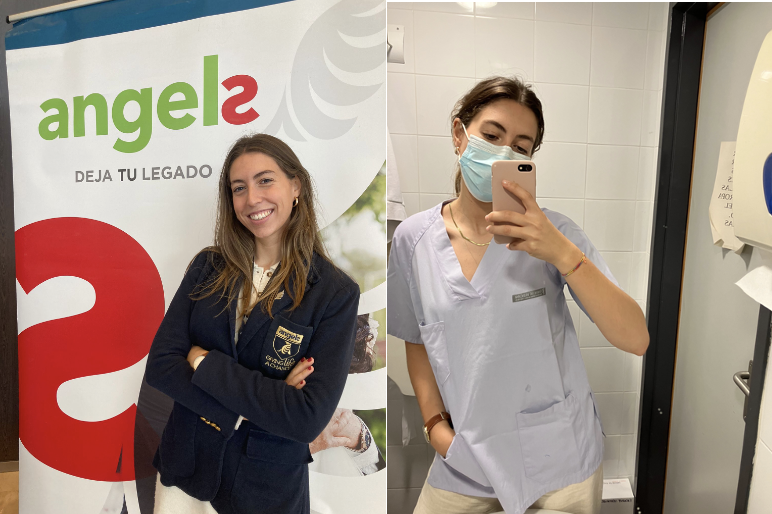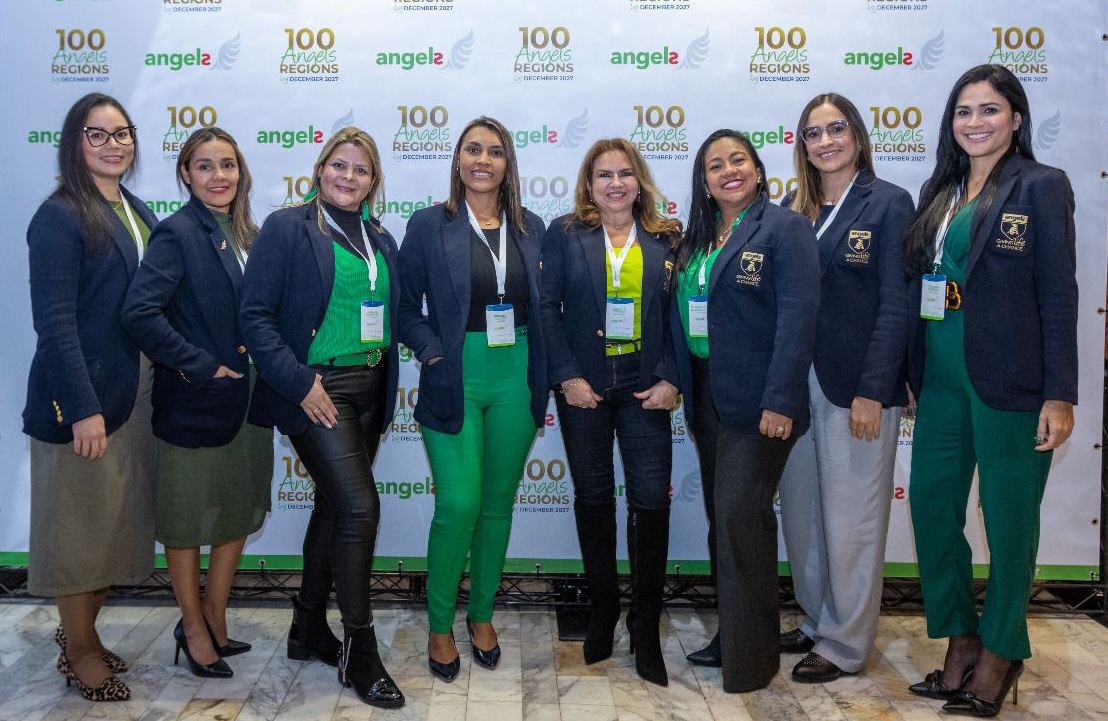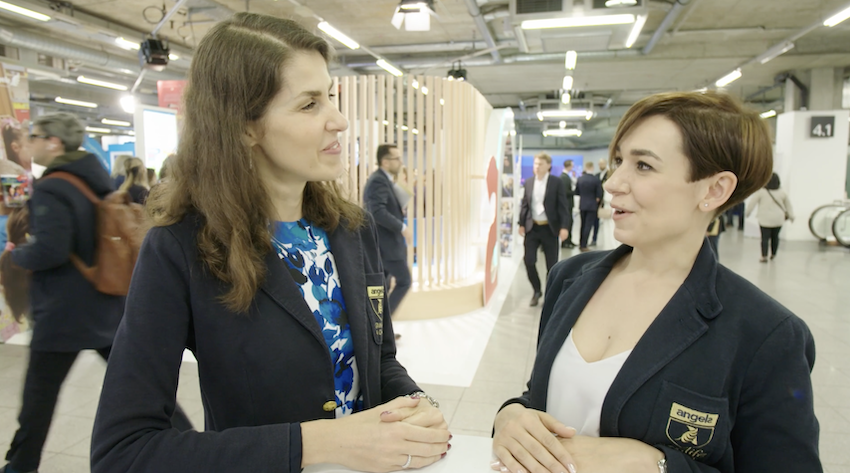
SKRAT po 19:00 v stredu 5. júl 2023 Maria Atienza zverejnila nasledujúcu správu v skupine anjelských konzultantov WhatsApp:
Dobrý deň, tím! Chcem sa s vami podeliť o to, že som včera bol celý deň neurológom v nemocnici de Alicante👩🏽⚕️. Počas môjho stretnutia s apoplexiou boli aktivované DVE apoplexie a opýtali sa ma, či chcem byť s nimi v oboch. Jeden bol trombektómiou medzi nemocnicami (dokonca mi ukázal zrazeninu, keď ju vybrali, bola to MASÍVNA oklúzia M1) a druhý bol trombolýza podaná do CT✅ (aj veľmi úspešná). Bola som ohromená, ako perfoliovali, a cítila som šťastie, že mám túto skúsenosť.🤍 Som taká hrdá na prácu, ktorú sme spoločne dosiahli.
Na fotografii, ktorú zdieľala, mala Maria na sebe bledomodré peelingy namiesto toho, aby mala na námorníckej modrej Anjelsovej blejzre. Tu rozpráva príbeh.
Máme kód cievnej mozgovej príhody
„Som anjelský konzultant pre Comunidad Valenciana, ktorý pozostáva z provincií Valencia, Alicante a Castellón. Ide o náročný región, pretože nedostatok zdrojov vytvára určitý stupeň odolnosti voči zmenám. Existujú však jasné miesta, ako je Dr. Nicolás López z Univerzitnej nemocnice General University Hospital of Alicante, ktorý vyvinul aplikáciu používanú piatimi nemocnicami v regióne na registráciu svojich apoplexií.
Prichádzam z Barcelony a minulú noc som strávil vo Valencii, kde som v utorok ráno o 9:00 navštívil univerzitnú nemocnicu Doctor Peset University Hospital. Odtiaľ je to asi 90 minút do Alicante, kde s Nicom budeme diskutovať o tom, ako by sa údaje aplikácie mohli automaticky preniesť do registra cievnej mozgovej príhody, RES-Q. Potom si zoberiem niečo na jedenie a vrátim sa do Barcelony.
Nico bol zamestnaný v to ráno a počas nášho stretnutia mal rang mobilného telefónu. „Máme mŕtvicu,“ povedal.
Táto nemocnica je hlavnou nemocnicou v Alicante a jedinou, ktorá vykonáva trombektómiu. Pacient, pre ktorého bol kód aktivovaný, pochádzal z inej nemocnice. Mal 87 rokov a prežil predchádzajúcu cievnu mozgovú príhodu.
V tom istom čase prišiel ďalší hovor. Tento pacient, predtým zdravý 55-ročný muž, mal mozgovú mŕtvicu pri turistike s priateľom. Pri iba jednej trombektomickej miestnosti bolo rozhodnuté.
Nikdy som nevidel veľkú nemocnicu, ktorá by musela urobiť také ťažké rozhodnutie. Bolo rozumné, že nemocnica musí optimalizovať svoje zdroje, ale keby bol 87-ročný chlapec mojím starým otcom, považoval by som to za veľmi ťažké.
Strácali sme čas
Keď sa Nico opýtal, či si chcem zmeniť oblečenie a pozrieť kód zdvihu, samozrejme, že som povedala áno! Premenil som sa na čistiace prostriedky, ktoré mi dali, a pripojil som sa k nim na pohotovostnom oddelení, aby som počkal na sanitku.
Pacient bol pri príchode frustrovaný a plakal. Návštevník z Holandska nielenže neporozumel španielčine, ale mal obrovskú afáziu a nevedel vôbec hovoriť. Nico vykonal NIHSS v angličtine a jemne mu vysvetlil, že ho vezmú do miestnosti KS, aby potvrdil diagnózu a liečil ho.
Príznaky pacientky sa začali o 10:00 hod. Bolo to okolo 11:45, takže bol stále v liečebnom okne. Lekáreň už bola informovaná o príprave trombolytika. Diagnóza však nebola jasná. Hoci jeho klinické štúdie naznačovali masívnu cievnu mozgovú príhodu, nemohli vidieť oklúziu. A stratili sme čas.
Pacient mal vysoký krvný tlak, čo je kontraindikácia trombolýzy. Keď znížili tlak, začali liečbu na CT a potom ho preniesli na apoplexiu.
Teraz to bolo okolo 12:30.
O dvadsať minút neskôr pacient požiadal o telefón. Stále bol afázický, ale dokázal trochu hovoriť a písal oboma rukami. Ukázalo sa, že to bola malá oklúzia a napokon by nepotreboval trombektómiu.
Prešiel som jedným prechodom
V tom istom popoludní bol tím upozornený na presun 73-ročného pacienta s mozgovou mŕtvicou z nemocnice de Torrevieja o hodinu ďalej. Žena užívala antikoagulanciá, a preto nespĺňala podmienky na fibrinolýzu. Išla by na trombektómiu hneď po príchode.
Teraz je 15:00 a Nicova zmena sa skončila, ale zostala som s ostatnými, keď čakali na ulici pred nemocnicou, aby pacient prišiel.
Stav tohto pacienta sa zdal byť menej závažný ako stav predchádzajúceho. Mohla trochu hovoriť, ale bola zmätená. Bola návštevníčkou z Nemecka a nevedela španielsky, ale jeden z neurológov, ktorý strávil rok v Nemecku, s ňou hovoril v nemčine.
Je to jedna z výziev v Alicante, že zdroje sú pridelené na základe obyvateľstva. Tento región je veľmi populárny u turistov, z ktorých niektorí sa počas dovolenky zapájajú do rizikového správania. V lete vidia až päť ťahov za deň a zamestnanci hovoria nemčinou, ruštinou a samozrejme angličtinou.
Pridala som sa k neurológom a pozerala som sa na veľkej obrazovke, keď katéter prešiel z slabín do mozgu. CT ukázalo masívnu oklúziu M1, ale po jednom prechode sa dosiahla úplná rekanalizácia. Trvalo to asi 30 minút. Bola som taká nadšená!
Prišiel som do Alicante okolo 11:00 a teraz je 17:00. Vzrušenie, ktoré som zabudol jesť, ale nebol som hladný. S Barcelonou vzdialenou päť hodín by som sa domov nedostala až o 22:00. Nevadilo mi to, bola som taká šťastná.
Keď som prišla domov, zavolala som svojej mame a povedala som jej, že teraz musím ísť na skúšaný liek! Vždy som chcela byť lekárkou, ale život sa stáva. Len som zmeškal/-a prijatie do lekárskej školy a namiesto toho som študoval/-a lekáreň. Na chvíľu som rozmýšľala, či by som mala test zopakovať.
Toto je to, za čo bojujeme
Ako konzultant ma táto skúsenosť ovplyvnila mnohými spôsobmi. Podarilo sa mi vidieť skutočný vplyv našej práce. Vyrástla som, keď som videla Anjelove vrecko na mozgovú príhodu v simuláciách a myslela som si, že je to len preto, že sme tu. Keď som ich videl, ako si vzali tašku a povedzme, poďme behať, bol to takmer šok.
Kým sme čakali na sanitku, neurológ sa opýtal každej prichádzajúcej sanitky, je to môj kód mozgovej príhody? Toto zmýšľanie je to, za čo bojujeme. Bolo to také prospešné vidieť.
Cyklický tím v tejto nemocnici robí viac s menším množstvom. Napriek obmedzeným zdrojom zavádzajú takmer dokonalú cestu. Liečia sa na CT, vykonávajú testovanie v mieste poskytovania zdravotnej starostlivosti a vždy ich vopred upozorňuje sanitka alebo odporúčajúca nemocnica. Pacient je vopred prijatý a zdravotné sestry v triede vedia, že kód prichádza. Po otvorení nového ER pacient prejde priamo na CT.
Lekári v Alicante ma prinútili cítiť sa súčasťou tímu. Nenechali ma stáť vzadu, kládli mi otázky a zapojili ma do rozhovoru. Potom jeden z neurológov povedal, že som v Alicante pracoval len niekedy, nemám víziu rôznych nemocníc, ako si ty. Povedzte nám, ako nás vidíte, poskytnite nám spätnú väzbu, ako sa môžeme zlepšiť? Cítila som sa cenná.
Môj vzťah s tímom sa úplne zmenil. Mám pocit, že sa na nich môžem spoľahnúť, že urobia, čo môžu, aby pomohli. Už uvažujem, že ich použijem ako príklad pre región.
Prejsť s prietokom
Doteraz bola tvrdou časťou mojej práce jednanie s ľuďmi. To môže byť stále pravda, ale táto skúsenosť ma posilnila.
Keď som túto nemocnicu navštívila minulý december, bola som konzultantkou len necelý mesiac. Myslela som si, čo môžem povedať, že ešte nevedia? Ale stále som čítala a učila sa a pri tejto príležitosti som zistila, že som vedela, čo sa mám opýtať, vedela som, na čo mám odpovedať.
Dozvedel som sa tiež, že je niekedy v poriadku pustiť sa do práce. Ako konzultanti tvrdo pracujeme na tom, aby sme zorganizovali celé naše dni – kedy cestovať, kedy sa stretnúť, kedy zaspať. Väčšinou som veľmi štruktúrovaný/-á, všetko si píšem, bojujem s improvizáciou. No tentokrát mi to nezaujímalo, čo som v tom popoludní plánoval urobiť.
Trávenie času s lekármi je dôležité, pretože inak sa takáto skúsenosť nemôže stať. A keď príde príležitosť, mali by ste ju využiť. Ani nad tým nepremýšľajte, pretože takáto šanca sa môže vyskytnúť iba raz.“



